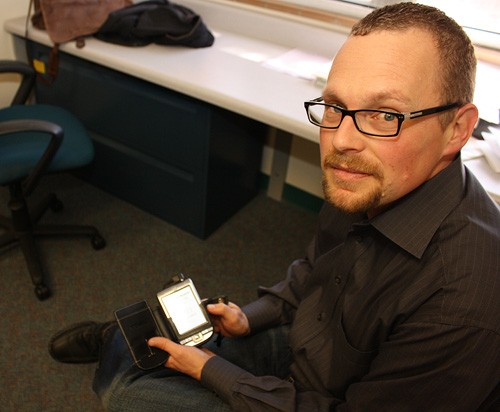Unhappy? Perhaps too much small talk is the problem.
UA assistant psychology professor Matthias Mehl and other researchers at different institutions found that happier people participate in less small talk and more substantive conversations.
Mehl and other researchers rated the participants’ conversations on depth and substance.
The researchers used the Electronically Activated Recorder, a method developed by Mehl, to aid them in their research.
The Electronically Activated Recorder is a device attached to participants that samples their activities and conversations as they go about their daily lives.
Participants came to Mehl’s lab, got the recorder and a microphone, and the device was activated every 12 and a half minutes to record the sounds around participants.
“”We counted the percentage of participants’ conversations that were small talk and the percentage of people with substantive conversations and found that happy people had reliably and quite a bit less small talk and quite a bit more substantive conversation,”” Mehl said.
A total of 79 people participated in the four-day study.
Counseling and Psychological Services Assistant Director Glenn Matchett-Morris said that CAPS couldn’t draw any conclusions from Mehl’s study but still found the research “”thought provoking.””
“”The study Dr. Mehl proposes next could be very informative if he finds evidence that less small talk and more substantive conversations result in more happiness,”” Matchett-Morris said. “”That might inform counseling interventions we do with students who believe they are not good at small talk.””
Matchett-Morris said this research could be applied to students seeking CAPS help.
“”We see a lot of students at CAPS who don’t feel they have the social skills or they have too much social anxiety to engage in small talk,”” Matchett-Morris said. “”Many assume that, if only they were better at small talk, they would be happier.””
He believes proving cause and effect with this particular study is difficult.
“”It might be that people who have a larger number of substantive conversations do so because they have a larger social network and therefore have more people in their life with whom they feel comfortable enough and safe enough to have meaningful conversations. This might indicate that, rather than conversations, it is one’s social network that contributes more to happiness,”” Matchett-Morris said.
Though she was not involved in the study, Susan Turk Charles, an associate professor of psychology at the University of California, Irvine, stressed the importance of having meaningful conversations.
“”It really is important in your life. It should be something that you prioritize just as much as you prioritize, maybe, working on your career or getting that project finished,”” Turk said.
Mehl determined who was happy by questionnaires, by people who identify as happy and by people whose friends identify them as happy.
“”We’re meaning-makers,”” Mehl said. “”We need to derive meaning from our lives to be happy. One way to do so is by bouncing ideas off and talking about things with other people. By finding meaning in life, we become happy, and it’s easy to do so with substantive conversations rather than with superficial conversations.””
Mehl added that people often connect better with others as they engage in more substantive conversation.
“”The next step is, can we prescribe people to have more substantive conversations? And does that make them happier?”” Mehl asked.









